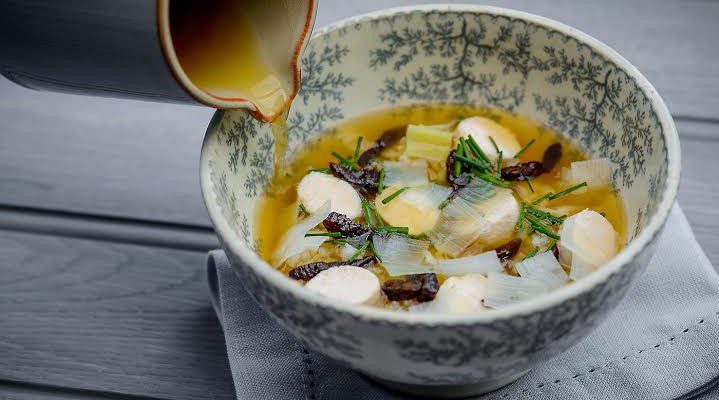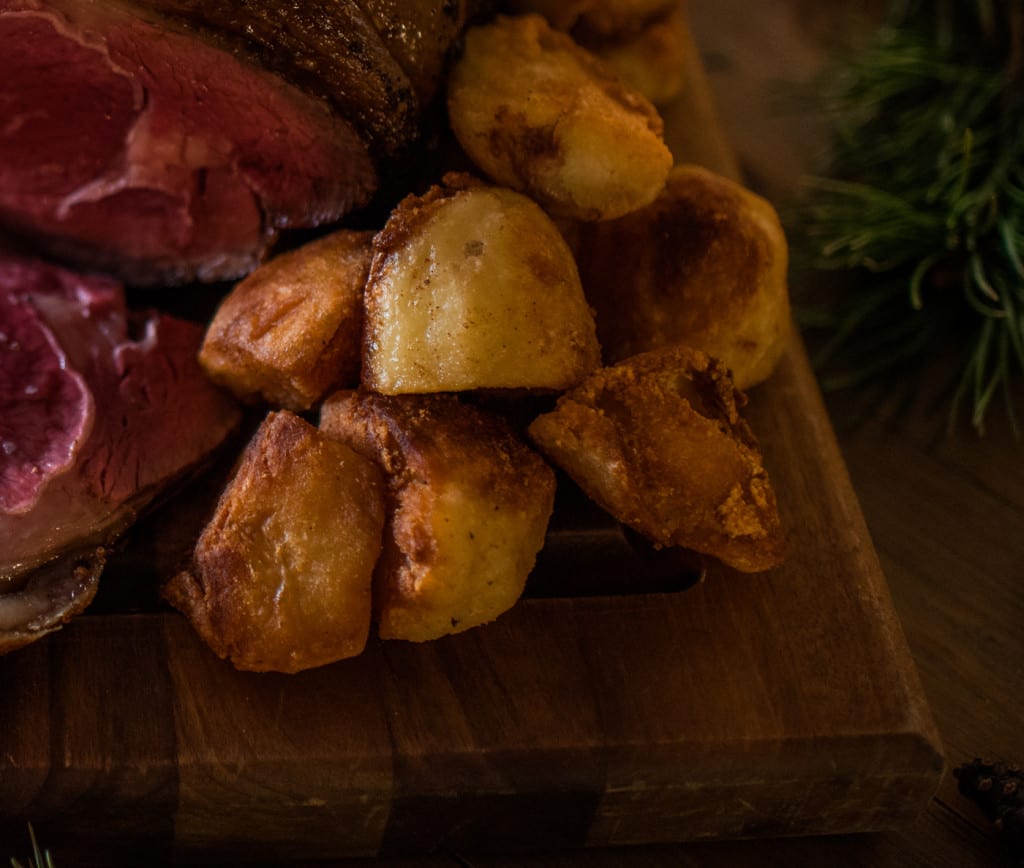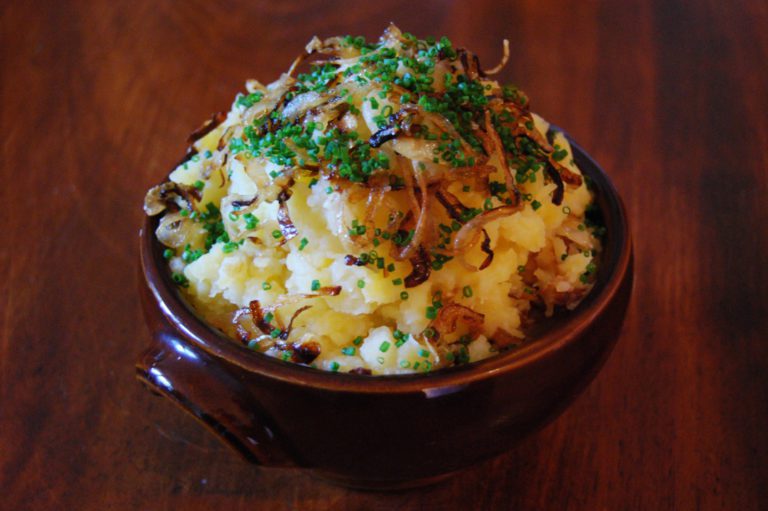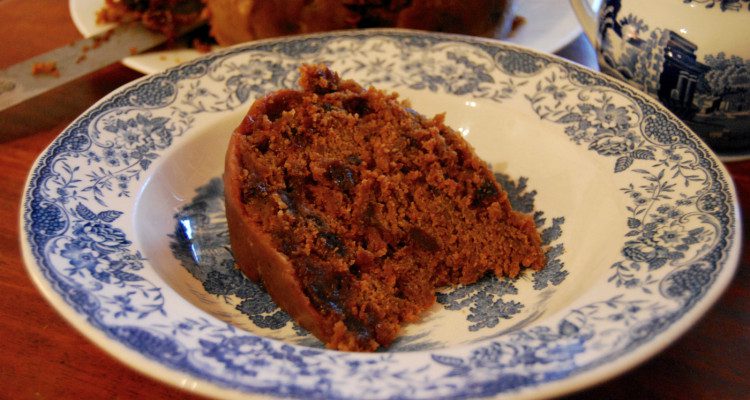Chances are many of you will be getting things off to a Scottish start with breakfast items like Scottish smoked salmon and poached eggs or even a fry up but what about the biggest meal of the day?
Here are some ideas for Scottish dishes to give you a little festive inspiration.
Traditionally, most Scottish families usually start off with a soup and cock-a-leekie tends to be a favourite at this time of year - a well-loved concoction of chicken and leek bulked out with barley or rice.
However, there are other options which you can find here in our winter soup recipes article.
(Recipe by Tom Kitchin)

1 whole free-range chicken
1 leek
1 onion
2 carrots
1 sprig thyme
5 white peppercorns
1 bay leaf Salt
200g basmati rice
50g chopped prunes (optional)
20g chopped parsley
1 chopped leek
Method
1 In a large pan cover the chicken with cold water and bring to the boil. Add the vegetables and herbs and cook slowly for two or three hours until the chicken is cooked. Remove the chicken and vegetables from the stock and season to taste.
2 Meanwhile, cook the basmati rice and chopped leeks in boiling salted water. Chop the prunes (optional if you want to add them) and parsley, keeping aside for garnish.
3 Breakaway the chicken from the bone.
To serve: In a bowl place the cooked rice, chicken, prunes (optional) and chopped parsley. Cover in stock and serve.
For something a little more modern, why not whip up some haggis bon-bons courtesy of Derek Johnstone to serve as canapés with your pre-dinner Champagne.
(Recipe by Derek Johnstone)
5 tbsp pasteurised mayonnaise
2 tsp Arran mustard
30ml Glenkinchie (or other non-peated single malt) whisky
360g finest quality haggis (or veggie haggis)
100g seasoned flour
3 free-range eggs, beaten
200g pinhead oatmeal
vegetable oil
salt and pepper
1. Mix the mayonnaise, mustard and whisky in a bowl and place in the fridge until needed.
2. Roll the haggis into 24 individual balls (approximately 15g each).
3. Arrange the flour, beaten eggs and pinhead oatmeal into three separate bowls.
4. Dip each haggis ball into the flour then the beaten egg and finally into the oatmeal and put to one side.
5. Carefully heat the vegetable oil in a deep fat fryer or a deep pan until it reaches 170C.
6. Place the individual haggis balls into the hot oil to deep fry for four minutes then drain on kitchen paper and season lightly with salt and pepper.
7. Serve straight away with a generous helping of the mustard and whisky mayonnaise.
So we are fairly certain most of you will already have the perfect main dish sorted, be it turkey, ham or even salmon but to help we have some great Scottish sides to delight the family and wow your friends.
Tom said: “For me, no Christmas dinner is complete without really good roasties. Get yourself some quality potatoes and roast them in goose fat – it’s the best way to make them lovely and crisp on the outside and soft, warm and fluffy in the middle.
"I can never resist pinching a few when no-one else is watching before they even reach the dinner table."

Picture: Marc Millar
1kg potatoes – preferably Maris Piper, peeled and halved or quartered depending on size
100g goose fat
salt
1.Place a large roasting tin in the oven, and preheat the oven to 200C/Gas Mark
2.Meanwhile, wash, peel and cut each of your potatoes into two or four equal sized pieces. Place the potatoes in a large pan, add a pinch of salt and cover with water, then bring to the boil.
3.When the water reaches boiling point, lower the heat and simmer for a few minutes. Add the goose fat to the hot tray and place back in the oven for a few minutes.
4.Drain the potatoes, shaking and bashing them a bit as you do so to get them nice and fluffy. Very carefully place them into the roasting tin, covering each all over in fat – use a spoon or fish slice to mix it all up.
5.Spread the potatoes evenly in the tin, then pop them back in the oven.
6.Roast for 15 minutes, turn the potatoes over and place back in the oven for another 15 minutes, then repeat for a third time, making sure they are really golden and crispy.
To serve: Sprinkle with salt and serve with your choice of roast.
(Provided by food historian Fraser Wright)
Ok, so not traditionally a Christmas dish it's a great addition to any Christmas feast.

Ingredients
1 small swede (Swedish turnip), roughly 500g, (i.e. the size of a grapefruit)
3 medium potatoes, roughly 500g (Desiree are of course the best for mashing, but mealy potatoes, such as Golden wonder or Records, are what were traditionally grown in Scotland)
1 medium brown onion (optional)
small bunch of chives (optional)
butter
salt and pepper
nutmeg (optional)
Method
1 Prepare the turnip by removing the outer skin, then cut it into small and even cubes.
2 Peel the potatoes and chop them into cubes. Boil both vegetables in salted water in separate pots.
3 Meanwhile, peel and slice the onion as thin as you can, then fry it slowly in a pan with a little butter, or cooking oil, until well browned, sweet and crispy.
4 When the turnip and potato are soft, when they can be pierced easily with a sharp knife, drain them and leave them to steam for 5 minutes to help get rid of any excess water.
5 Mash the turnip and potato together in a pot over a low heat, this helps to remove any excess water, and to keep it hot. Add a generous knob of butter, a grating of nutmeg and grinding of black pepper.
6 Stir half the onions through and save the rest for the top. Check for seasoning and serve sprinkled with the remaining onions and chives.
Scots are renowned for having a sweet tooth so it's no surprise we have an abundance of delicious dessert recipes.
(Provided by food historian Fraser Wright)
Clootie dumpling makes for a good Scottish alternative to Christmas pudding, having much the same DNA – a rich, spiced, steamed pudding of apples, raisins, sultanas, cinnamon and allspice, ginger and nutmeg, cooked by wrapping in a cloth (or cloot, in Scots) and simmering in hot water and served with custard or cream.

• 500g plain flour (or plain cake flour)
• 200g beef suet
• 250g castor sugar
• 250g raisins
• 250g sultanas
• 1 tsp ground cinnamon*
• 1 tsp ground allspice
• 1 tsp ground ginger
• 1/4 tsp freshly grated nutmeg
• 3 tsp baking powder
• 1/2 tsp salt
• 2 large eggs
• 1 bramley apple, peeled and grated
• 3 tbsp black treacle
• 100ml whole milk
• extra plain flour for dusting
*you could add 3 tsp mixed spice instead of adding the cinnamon, allspice, ginger and nutmeg.
1 Bring a very large pot of water to the boil, the largest you have. You want to leave 2 - 3 inches of water from the top to make sure the dumpling can be accommodated. Equally there needs to be enough water to make sure the dumpling has room to float.
2 Meanwhile, in a large mixing bowl combine all the dry ingredients (flour, sugar, spices, salt, baking powder, dried fruit and beef suet). In another bowl mix the eggs, milk and black treacle together with the grated apple. Then combine the wet mixture with the dry mixture.
3 Dip your dumpling cloot into the boiling pot of water to soak it for a few minutes.
4 Wring it out to remove the excess water. Now spread the cloot* over a large work surface and dust it fairly generously with plain flour.
5 The layer of flour does not need to be thick but do make it even. The wet cloot and flour combine to form a protective glue-like waterproof surface so make sure the flour reaches far enough to the edges of the cloot, so that the flour will cover the whole dumpling when the cloot is drawn up around it.
6 Empty the dumpling mixture on to the cloot and draw up the cloot around it.
7 Tie it with string, wrapping the string twice around, tie it twice as tight as can be pulled. When you tie the cloot leave a bit of spare room at the top, for the dumpling will expand a little.
8 Make sure to cut a generous length of string so you can tie the excess on to the pot handles to suspend the cloot when it is submerged in the water.
9 Put the lid on and keep on a low simmer for 4 hours. When the dumpling is ready you can lift it out by the string that was attached to the handle. Remove the cloot and transfer the dumpling to a baking tray.
10 Dry the dumpling in a 180˚C preheated oven for 15 - 20 minutes. When you first remove the cloot you will have a white glutinous skin which covers the surface of the dumpling.
11 After it has been in the oven it will become darker and form a nice crust on the outside of the dumpling.
*For the cloot (cloth) make sure to use a good quality tea towel, not terrycloth but flat with a dense weave. Sometimes in ironmongers or kitchen shops you see clootie dumpling bags like I used. Otherwise you can buy a length of calico from a haberdashery.
(Provided by Mark Greenaway)
For something a little lighter, Cranachan is always a crowd-pleaser.
Similar to Eton Mess, this dish was traditionally made with crowdie cheese but modern recipes (which are more like assembly instructions, making this a quick and easy option) tend to swap in whipped cream – plus Scottish raspberries, oats, honey and whisky.
250mls double cream
80g caster sugar
One 200g punnet of Scottish raspberries
60g rolled oats
A good glug of your favourite whisky
One packet of meringues broken into shards or you could be brave and make your own
1 Add half the sugar to the oats and roast in your oven or under the grill until golden brown then leave to cool.
2 Add the rest of the sugar to the cream and whip to soft peak.
3 Add in the cooled oats and raspberries, reserving some of the raspberries for garnish and add as much whisky as you dare.
5 Gently fold all together and spoon into glasses. Garnish the top with the rest of the fresh raspberries and crumbled meringue.
Why not round off the meal with some coffee and a cheeseboard?
Stock it with Scottish favourites such as Caboc – Scotland's oldest cheese originating in the Highlands in the 15th century – a cream cheese rolled in toasted oatmeal; sheep's-milk Lanark Blue from Errington; the mild, soft and Cheddar-like Dunlop; soft Bonchester and Isle of Mull Cheddar – don't forget the oatcakes.
